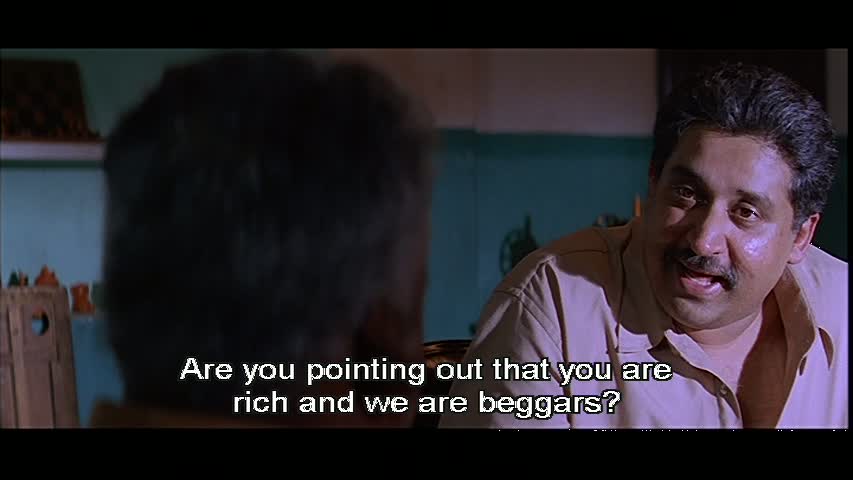Karthik (Madhavan) and Shakthi (Shalini), two people from diverse backgrounds catch a glimpse of each other. Everything about them is different. His hair is all ruffled, hers falls down like a cascade, refusing to be tied down. Soon though they’re in love, and it is time for the parents to meet.
While the train and station are also a home of sorts for her, and walking up and down the stairs, her routine, both are a passing fancy for him. He’s the boy on a bike, with music in his ears from a headphone. He comes from a family that seems attached, but there’s a certain space. His lawyer father has a certain disdain about him, a sneering attitude. She’s from a family where parents and daughters play cards together. Her father has an inherent dignity about him, and also the ability to spot a snide remark from afar.

maxresdefault
Keep all the breeziness of Alaipayuthey and its cutesy dialogues on one side of the scale, and the one line, “Sir, eppa Sir varudhu ungalukku indha oru garvam…” on the other, and you’ll end up with a perfect balance. For, as much as Mani Ratnam’s Alaipayuthey, which celebrates 20 years today, was about the flush of a sudden inexplicable love, the raptures it leaves a couple in, and the attendant heartache, it was also a great study in class differences.
Co-written by Mani Ratnam and R Selvaraj, many of the dialogues have remained popular, despite life changing unrecognisably from when the film was made.
In all the love for its love story, not much has been written about the integrity with which the film approaches Shakthi’s background and lifestyle. From the overcrowded dining table and the upma that’s a breakfast staple in Shakthi’s house to her mother who tucks up a portion of her sari, the stainless steel water filter, the plastic koodai that holds vegetables, and the put-together cloth that doubles up as a curtain, this was a living, breathing house in a railway colony.
Where, the father can throw his daughter’s belongings down, but the one helping her to the auto will be the friendly neighbourhood store owner, and where children of the colony chase the auto taking their Shakthi akka away. In the same breath, it paints Karthik’s home with a lushness befitting his father’s background, and a certain aloofness too. The curtains are just so, the walls are pastels, artefacts dot the house, and the dining table is just that, not a holder of objects. His mother can hardly raise her voice; when she does, she’s shown her place. In many ways, Shakthi’s mother is the more empowered one.
Shakthi’s father has raised her like a princess, despite their middle-class existence. The rich lawyer has raised Karthik to be middle-class, he insists. One has immense faith in his daughter, reason why he can’t handle her secret marriage; the other has little hope from the son — he uses cynicism to mask his hurt.
Recommended
When the worlds of the individuals, Karthik and Shakthi, mingle and collide, it is divine justice that their new life together begins in a run-down, yet-to-be finished house. She happily settles into her routine there. Karthik is still playing house in his new home; it’s a far cry from the life he’s used to. Two things in that un-finished house speak of his background — the multi-colour mirror and the chatai on one of the windows! The rest is as raw and new as Karthik and Shakthi.
As the two learn to adjust and live with each other, the class differences seem to blur, but it takes an accident for the young couple to really know what they mean to each other. And possibly, if the film did not conclude with that shot in the hospital, we might have seen the unfinished house truly become a home and a union of people from different classes, held together by just love.



